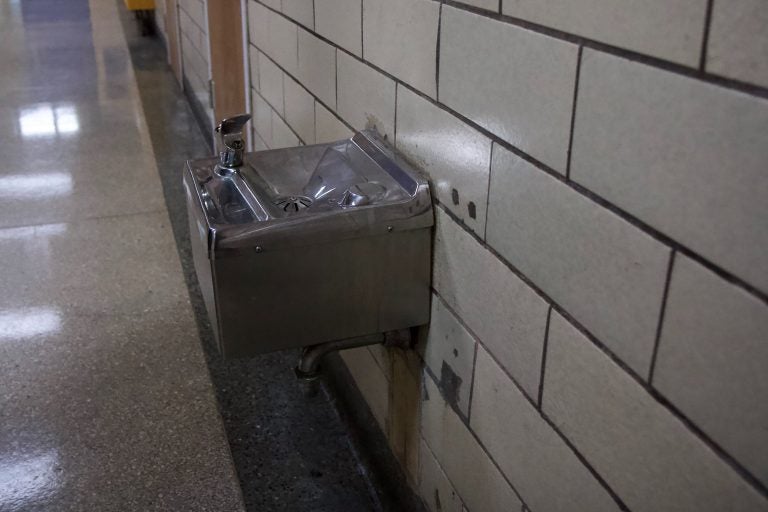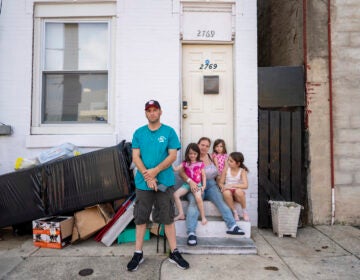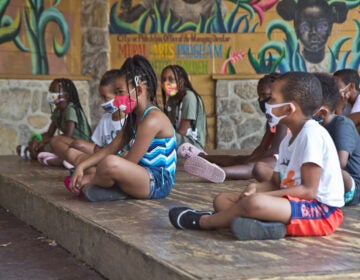Most Philly charter schools failed to test water for lead –– and city gave them a pass
The city agencies tasked with oversight have failed to enforce Philadelphia’s post-Flint crisis water quality standards.
Listen 1:51
(Kimberly Paynter/WHYY)
Two years after Philadelphia officials pledged to crack down on lead in drinking water at school buildings, most city charter schools still haven’t tested for the dangerous neurotoxin. The lapse was not caught until now because the city agencies tasked with oversight have failed to enforce Philadelphia’s post-Flint-crisis water quality standards.
The rules are simple: City Council passed legislation in 2017 requiring all Philly public schools to test for lead once every five years and post results online for review. The School District of Philadelphia has complied with this law. But a PlanPhilly/Keystone Crossroads investigation found that 45 out of 64 charter schools required to conduct independent lead tests ignored these requirements.
Several school administrators contacted for this story seemed shocked to hear about the law.
“What lead tests?” asked Edward Poznek, CEO of the Christopher Columbus Charter School. “I don’t know anything about it.”
Lead can have major negative impacts on childhood brain development. When a previous PlanPhilly/Keystone Crossroads report revealed last month that Mastery Charter School officials failed to notify parents about high lead levels detected in an elementary school’s drinking water, parents were livid. Yet, Mastery turned out to be one of the few schools that even bothered to test for lead in their schools’ drinking water.
Administrators at dozens of schools that failed to post lead testing results online were called and emailed for this story. Many ignored requests for comment. Thirteen schools indicated they would immediately initiate lead tests or had conducted tests shortly after being contacted.
However, school officials, like Poznek, have at least one good reason for still being in the dark: The city hasn’t enforced its own rules.
Councilperson Helen Gym, who authored the testing law, said she intended her legislation to be backed up by inspectors from the city’s Department of Licenses & Inspections and the Health Department. Instead, PlanPhilly/Keystone found that neither agency ever took up the work of certifying that city charter schools had tested for lead.
After being contacted by reporters, Karen Guss, a spokesperson for L&I, acknowledged there had “not been an administrative process in place for compiling information from water testing results.”
While Gym said she intended her legislation to set one of the strictest lead standards for school drinking water in the nation, the law designed to protect children simply fell through the cracks.
Guss promises that will change next year.
“In consultation with the Health Department and the School District, L&I will put such a process in place,” she said.
Yet while the underlying legislation makes lead testing a prerequisite for school building occupancy, Guss could not say what penalty schools would face for skipping tests.
“The consequences of not qualifying for a special certificate of inspection will be determined going forward,” she said.
Donna Cooper, executive director of Public Citizens for Children and Youth, said the city’s failure to enforce its own rules was “very disappointing” given the lifelong impact lead can have on childhood brain development.
“The risk of lead poisoning is grave and permanent,” Cooper said.
Mike Dunn, a spokesperson for Mayor Jim Kenney, described the enforcement lapse as unfortunate.
“It’s a tremendously large government charged with enforcing thousands of laws, and this particular legislative mandate was unfortunately not fulfilled,” Dunn said. “Your reporting brought it to our attention, and we’re going to fix it.”
New schools, old buildings
The construction of most traditional public school buildings in Philadelphia largely mirrors the city’s boom years, from the 19th century to the mid-20th century. That building surge coincided with the rising use of lead-based solder or piping, materials now cited as the main source for water-based lead contamination.
Lead solder and piping were effectively banned by a 1986 congressional amendment to the Safe Drinking Water Act. But that doesn’t mean the toxin has disappeared from schools built prior to 1986. For districts like Philadelphia, the size of school buildings and pervasiveness of the materials has made lead abatement a costly ongoing project.
Charter schools are not immune. The sector emerged in the late 1990s as a result of state legislation and early operators often raced to secure whatever large buildings were immediately available. New Foundations Charter, in Northeast Philadelphia, converted a former Superfresh grocery store, for example. The nearby Franklin Towne charter schools took over part of a deactivated Army munitions depot. Still others occupied vacant public or Catholic school buildings, while some built entirely new buildings.
On the whole, though, charters still tend to occupy older structures. Property data from L&I shows that the average charter school building was about 60 years old. And, out of the 45 schools that failed to test for lead, 30 were built before the lead ban, with an average age closer to 90 years.
Many stories, few tests
Just 19 schools run by eight different charter operators –– Boys’ Latin, Community Academy of Philadelphia, FACTS, Friere, KIPP, Mastery, MaST Community Charter, and YouthBuild charter schools –– appear to have conducted lead testing in response to the law.
Another 21 charters, known as “Renaissance Schools,” occupy buildings owned by the School District of Philadelphia, which conducted lead tests at all buildings it directly controls two years ago. The district declined to release these test results without a right-to-know request.
The fact that many schools either didn’t test or didn’t respond to repeated requests for comment left some parents uneasy.
“It’s a little scary given what’s been going on with a lot of the other schools,” said Judith Dye, parent of a first-grader at Mariana Bracetti Academy, a school that appears not to have tested its water.
A report is not available on its website and school officials did not respond to multiple requests for comment. However, the K-12 school occupies the former Northeast Catholic High School building, which dates to the 1920s.
“That should be more reason why they should be testing,” said Dye, of the building’s age. “They need to get on that.”
Two schools did technically conduct tests –– Multicultural Academy and Global Leadership Academy –– but produced results dating back to 2012 and 2010, respectively. Both reports were too old to be in compliance with the 2017 legislation, which requires results be current within five years.
Even one of the schools that did test proactively, YouthBuild Philadelphia Charter, failed to publicize important findings. Engineers detected a bathroom sink running water that exceeded safe levels for lead contamination inside the building, a former Nash Auto Company facility that dates to the 1920s.
School officials said the outlet was immediately disabled. But contrary to city law, the school never posted findings online until reporters called, and parents were never notified.
A few other schools, like Columbus Charter, Belmont Charter Network and Green Woods Charter completed lead testing after being contacted. Independence Charter School produced lead test results for one of its two schools that was dated two days after a reporter first emailed about their missing test results.
Although the Independence report did not reveal unusual levels of lead in the building’s taps, ICS parent Nadia Hironaka said the school’s eleventh-hour response felt out of character. Based on reports of tainted water at other Philly schools, she assumed administrators had been more vigilant.
“We’ve been so impressed with the school, including the responsiveness and engagement of teachers and administrators,” said Hironaka. “Their resistance to monitoring such a fundamental safety issue is perplexing and alarming.”
Officials at Wissahickon Charter School said they ordered water tests at both of their campuses after hearing a prior PlanPhilly/Keystone Crossroads story about lead contamination. A test at the school’s Fernhill campus revealed elevated lead levels in the building’s service line, but none in the actual fountains or sinks. As a precaution, administrators said, the school shut off water fountains and sent a notice to parents.
Belmont also detected lead contamination at multiple water outlets across two of the three school buildings they control: Inquiry Charter and Belmont Elementary/Middle school. A spokesperson for the school said a drinking fountain had been taken offline, but did not provide additional details.
The ASPIRA charter school chain claims to have hired “environmental experts” in October to begin lead testing. However, ASPIRA spokesperson Kevin Feeley could not say exactly when the tests took place or why the results were taking months to process.
“I don’t have that answer,” he wrote in an email. “But I believe that they are making a good-faith effort to collect the necessary information.”
Cooper, of PCCY, said scattershot compliance from charter operators was “a tragedy” for school children.
“Ignorance is not a defense. If you’re running a school, it’s your job to stay abreast of any statues or regulatory change about governing a school,” she said. “These were not hidden regulations. This was in the newspaper. There were press conferences.”
Bureaucratic blame game
Cooper says the sporadic compliance was indicative of the diffuse nature of Pennsylvania’s charter school laws, which she described as among “the worst in the country,” that allow each charter operator to effectively act as an independent school district with little oversight.
“One of the problems with creating this system of charter schools is that there’s no central governance authority over them,” she said. “This is one example of many where the oversight needed to protect children in these independent, quasi-public schools is nonexistent.”
But charter advocates say the blame lies with city officials, who need to do a better job keeping schools informed when laws change. Ana Meyers, who heads the Pennsylvania Coalition of Public Charter Schools, called out the School District of Philadelphia, which authorizes charter schools to operate.
“Charters don’t have a problem following mandates,” Meyers said. “I think what we are looking at is more of an authorizer issue. Many times the authorizer does not communicate the process and timeline put in place to the charter schools for the mandates. And then issues start to show up.”
Councilperson Gym contrasted the difficulty of herding some 50 charter operators along with the school district, which completed multiple rounds of lead testing at its 200-plus schools.
“With this many [charter] schools, it’s just hard to do,” she said. “They’re doing their own thing.”
—
Editor’s note: This story was updated at 10:55am on 12/11/19 to include comment from the School District of Philadelphia.
WHYY is your source for fact-based, in-depth journalism and information. As a nonprofit organization, we rely on financial support from readers like you. Please give today.








